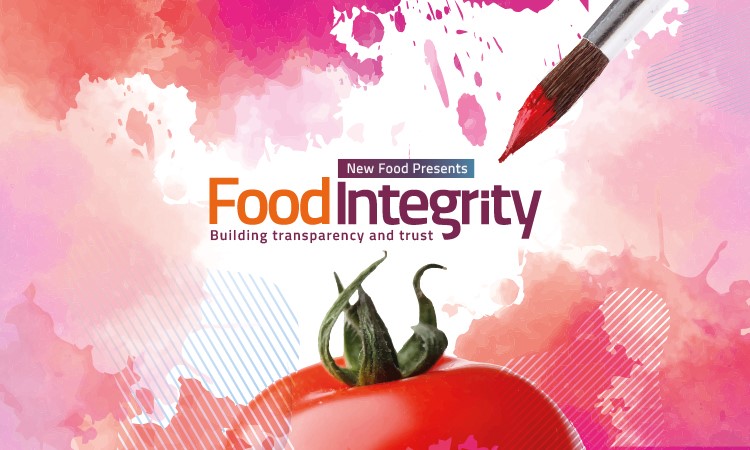Debate, share and learn at Food Integrity 2020 conference
- Like
- Digg
- Del
- Tumblr
- VKontakte
- Buffer
- Love This
- Odnoklassniki
- Meneame
- Blogger
- Amazon
- Yahoo Mail
- Gmail
- AOL
- Newsvine
- HackerNews
- Evernote
- MySpace
- Mail.ru
- Viadeo
- Line
- Comments
- Yummly
- SMS
- Viber
- Telegram
- Subscribe
- Skype
- Facebook Messenger
- Kakao
- LiveJournal
- Yammer
- Edgar
- Fintel
- Mix
- Instapaper
- Copy Link
Posted: 4 February 2020 | Nemanja Vukanic | No comments yet
itsu’s technical and quality lead urges industry to come together at Food Integrity 2020 to strengthen and improve our global food and beverage supply chain.


Food integrity has been part of nearly every discussion related to the food supply chain, but it has never been more relevant than it is today.
The food supply chain has evolved into a global tangled web as businesses seek to feed the world’s growing population. Consequently, industry is faced with ever evolving challenges.
Although food integrity is a concept that has existed for decades, its meaning has remained unclear to many stakeholders within the food industry. On one hand, food integrity implies having a global perspective of the food supply chain from farm to fork and everything in between (procurement, manufacturing, packaging, transport, etc.). On the other, it means the absence of any undeclared/ undesired ingredient that would impact food safety and public health.
The food industry is advancing quickly, and consumer sensitivity to food safety incidents and food fraud scandals is further amplified by almost-instant communication streams such as social media. There is an increased vulnerability for deception as the global food industry is faced with rapid innovation driven by technological advances and market developments, as consumer choices and preferences evolve. High profile food fraud incidents in the UK have further highlighted the vulnerabilities within the supply chain and the necessity for further controls to be implemented. Food standards and guidelines have been evolving to keep up with these developments in the industry, with BRCGS implementing clauses to address food integrity, and Defra and the Foods Standards Agency (FSA) helping to publish guidelines to tackle adulteration through risk assessment.
Join Nemanja Vukanic, Head of Technical and Quality, itsu, at the Food Integrity conference in March 2020, where he will be discussing the impact of food integrity alongside Danone’s Group General Manager of Quality and the founder of Planet Organic.
Research on food fraud prevention has extended beyond the traditional food science disciplines, and now includes social and behavioural sciences and criminology. In light of this, we saw a major response from the government as the National Food Crime Unit and the Scottish Food Crime and Incidents Unit were formed. Although this was a massive step in the right direction, it begs the question as to how the industry becomes more proactive and less reactive in the future?
The International Food Safety Authorities Network (INFOSAN) is a global network of national food safety authorities, managed jointly by the Food and Agricultural Organisation of the United Nations (FAO) and the World Health Organisation (WHO). INFOSAN provides an important platform for the rapid exchange of information during food safety emergencies and for sharing data and information pertaining to routine and emerging food safety issues.
Results from a WHO survey of members of the INFOSAN have recently been published; there was unanimous acknowledgement for the desire of more guidance and information on best practices in managing the full range of food safety events involving food fraud (97 percent), but also for prevention of such events (97 percent), indicating a need to provide technical support beyond acute incident response.
The laws, regulations, standards, certifications, and best practices for food fraud prevention are still in early development stages and further work is required on methodology and the administration of tests related to food authenticity. From historical data collected there is a need for expansion in testing methods in order to consider a wider range of food fraud types. As the breadth of food integrity incidents spans countless categories, it is crucial that industry leaders come together and share lessons learnt in order to implement more robust control measures and drive continuous improvement.
New Food’s Food Integrity 2020 event is a great opportunity to share learnings and exchange information on food integrity issues that are plaguing the industry today. I hope that through events such as this, we can increase transparency on food integrity issues and share information in advance of explicit issues, so to shift towards a proactive rather than a reactive system of response.
Nemanja Vukanic, Head of Technical and Quality, itsu
Nemanja holds a BSc in Biochemistry, Molecular Biology and Biotechnology, and an MSc in Pharmaceutical Quality Assurance and Biotechnology from Technological University Dublin in Ireland. After University Nemanja joined ABP’s Food Group, one of Europe’s largest red meat manufacturers, turning over €3 billion annually, as part of the Technical Management graduate programme.
After working across multiple primary and retails sites, Nemanja completed the technical training scheme in record time and headed up the Technical and H&S Departments at ABP Guildford. He now leads the Technical and Quality department at itsu [grocery] a crusading, dynamic and fast-growing, Asian-inspired brand founded by Julian Metcalfe, which has seen 40 percent YOY growth for the last three years. As part of his role he has travelled extensively within the global supply chain, conducting audits and developing relationships with major producers across the globe.
Related topics
Food Safety, Regulation & Legislation, Research & development, Supply chain, The consumer










